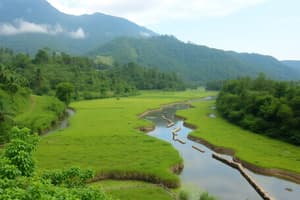Podcast
Questions and Answers
What is a direct consequence of deforestation on biodiversity?
What is a direct consequence of deforestation on biodiversity?
- Enhanced carbon sequestration in the atmosphere
- Increased habitat availability for various species
- Significant loss of habitat leading to species decline (correct)
- Improved soil fertility in deforested areas
Which type of pollution is most likely to harm aquatic life?
Which type of pollution is most likely to harm aquatic life?
- Light pollution affecting nocturnal animals
- Water pollution from industrial discharge (correct)
- Air pollution from vehicles
- Plastic pollution in terrestrial environments
How does climate change primarily affect ecosystems?
How does climate change primarily affect ecosystems?
- By reducing the amount of carbon dioxide in the atmosphere
- By increasing genetic diversity among species
- By trapping heat due to greenhouse gas emissions (correct)
- By stabilizing weather patterns for agriculture
What effect does biodiversity loss have on ecosystems?
What effect does biodiversity loss have on ecosystems?
What is a common impact of urbanization on ecosystems?
What is a common impact of urbanization on ecosystems?
Which of the following is a significant result of pollution?
Which of the following is a significant result of pollution?
What is one of the primary drivers of biodiversity loss?
What is one of the primary drivers of biodiversity loss?
What role do forests play in combating climate change?
What role do forests play in combating climate change?
Flashcards
Human Impact on Ecosystems
Human Impact on Ecosystems
Human activities significantly alter natural environments causing harm to biodiversity, stability, and ecological health.
Deforestation
Deforestation
Clearing forests for human use, like agriculture or development, resulting in habitat loss and increased greenhouse gas emissions.
Pollution's effect
Pollution's effect
Contamination of air, water, or land, harming human health and ecosystem functionality.
Climate Change Cause
Climate Change Cause
Signup and view all the flashcards
Biodiversity Loss
Biodiversity Loss
Signup and view all the flashcards
Urbanization's damage
Urbanization's damage
Signup and view all the flashcards
Greenhouse Gases
Greenhouse Gases
Signup and view all the flashcards
Ecosystem Services
Ecosystem Services
Signup and view all the flashcards
Study Notes
Human Impact on Ecosystems
- Human activities significantly alter ecosystems globally, often leading to negative consequences for biodiversity, resilience, and overall ecological health.
- These impacts manifest across numerous facets, including deforestation, pollution, climate change, biodiversity loss, and urbanization.
Deforestation
- Clearing forests for agriculture, logging, and urban development drastically reduces forest cover.
- This leads to habitat loss for numerous species, contributing to biodiversity decline.
- Deforestation is a significant source of greenhouse gas emissions, accelerating climate change.
- Reduced carbon sequestration capacity in forests further exacerbates climate change.
- Soil erosion increases, impacting water quality and agricultural productivity.
Pollution
- Pollution degrades air, water, and soil quality, impacting human health and ecosystem functionality.
- Air pollution contributes to respiratory illnesses and acid rain, damaging ecosystems.
- Water pollution, from industrial discharge and agricultural runoff, can contaminate crucial water sources and harm aquatic life.
- Plastic pollution, a growing concern, accumulates in ecosystems and harms various species.
- Noise and light pollution disrupt natural behaviors and communication patterns in animals.
Climate Change
- Human activities, primarily greenhouse gas emissions, are the primary driver of current climate change.
- Increased greenhouse gases trap heat in the atmosphere, leading to global warming.
- Climate change alters weather patterns, impacting agriculture, water resources, and overall ecosystem stability.
- Species face challenges adapting to rapid environmental shifts caused by climate change.
- Rising sea levels threaten coastal ecosystems and human populations.
Biodiversity Loss
- Reduced habitat availability and direct exploitation of species are major drivers of biodiversity loss.
- Climate change and pollution also contribute to species extinction and population decline.
- Biodiversity loss weakens ecosystems' resilience and their ability to provide essential ecosystem services.
- Loss of genetic diversity within species makes them more vulnerable to environmental pressures.
- The extinction or endangerment of one species can impact the entire ecosystem.
Urbanization
- Expansion of urban areas leads to habitat fragmentation and loss, negatively affecting biodiversity.
- Increased consumption and waste generation associated with urban growth contribute to pollution.
- Urban heat island effect leads to higher temperatures and stress on urban ecosystems.
- Urbanization can lead to altered hydrological cycles, impacting water availability and quality.
- High concentration of people in urban areas can put stress on resources and infrastructure, potentially impacting the surrounding environment.
Studying That Suits You
Use AI to generate personalized quizzes and flashcards to suit your learning preferences.



